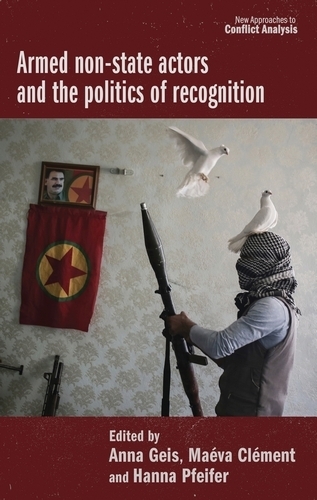
Armed Non-State Actors and the Politics of Recognition
(Hardback)
Publishing Details
Armed Non-State Actors and the Politics of Recognition
By (Author) Anna Geis
Edited by Mava Clment
Edited by Hanna Pfeifer
Manchester University Press
Manchester University Press
29th June 2021
United Kingdom
Classifications
Tertiary Education
Non Fiction
Armed conflict
Peace studies and conflict resolution
341.6
Physical Properties
Hardback
288
Width 156mm, Height 234mm, Spine 17mm
594g
Description
Contemporary violent conflicts often involve armed non-state actors (ANSAs).
Governments and international organisations are usually hesitant to enter negotiations with ANSAs . This volume analyses which impacts practices of social recognition have on conflict dynamics in the short and long term. By studying key asymmetric conflicts through the prism of recognition, it offers an innovative perspective on the interactions between ANSAs and state actors. The volume explores: In which contexts does granting recognition to armed non-state actors foster conflict transformation What happens when governments withhold recognition or label ANSAs in ways they perceive as misrecognition The authors examine the ambivalence of recognition processes in violent conflicts and their sometimes unintended consequences for ANSAs and local, national , and transnational communities. The volume draws on a wide range of case studies by experts, original field research, and innovative theoretical work.
Reviews
'This is a critically important book on the significance of recognition for non-state armed actors. The volume is based on a rich corpus of case studies problematizing recognition at various stages of conflict escalation. By investigating normative aspects as well as practices, it is a must-read for anyone interested in asymmetrical conflicts in the twenty-second century.'
Lisa Strmbom, Associate Professor of Political Science, Lund University
'We often think of insurgents or rebel armies as operating in places where there is no room for mutual recognition and other normative practices. But this is wrong. This book shines a spotlight on the complex role of recognition practices and their often positive consequences in some of the most intractable conflicts in the world.'
Volker M. Heins, Institute for Advanced Study in the Humanities, University of Duisburg-Essen, Germany
'This thought-provoking book explores the possibilities and pitfalls of recognizing armed non-state actors during conflicts, stalemates, and peace processes. Through insightful theoretical chapters and a wealth of case studies from around the world, it helpfully illuminates the complexities of seeking and granting recognition.'
Elizabeth King, Associate Professor of International Education, New York University
Author Bio
Anna Geis, Helmut Schmidt University/University of the Federal Armed Forces Hamburg
Mava Clment, University of Osnabrck
Hanna Pfeifer Goethe University Frankfurt and the Peace Research Institute Frankfurt
